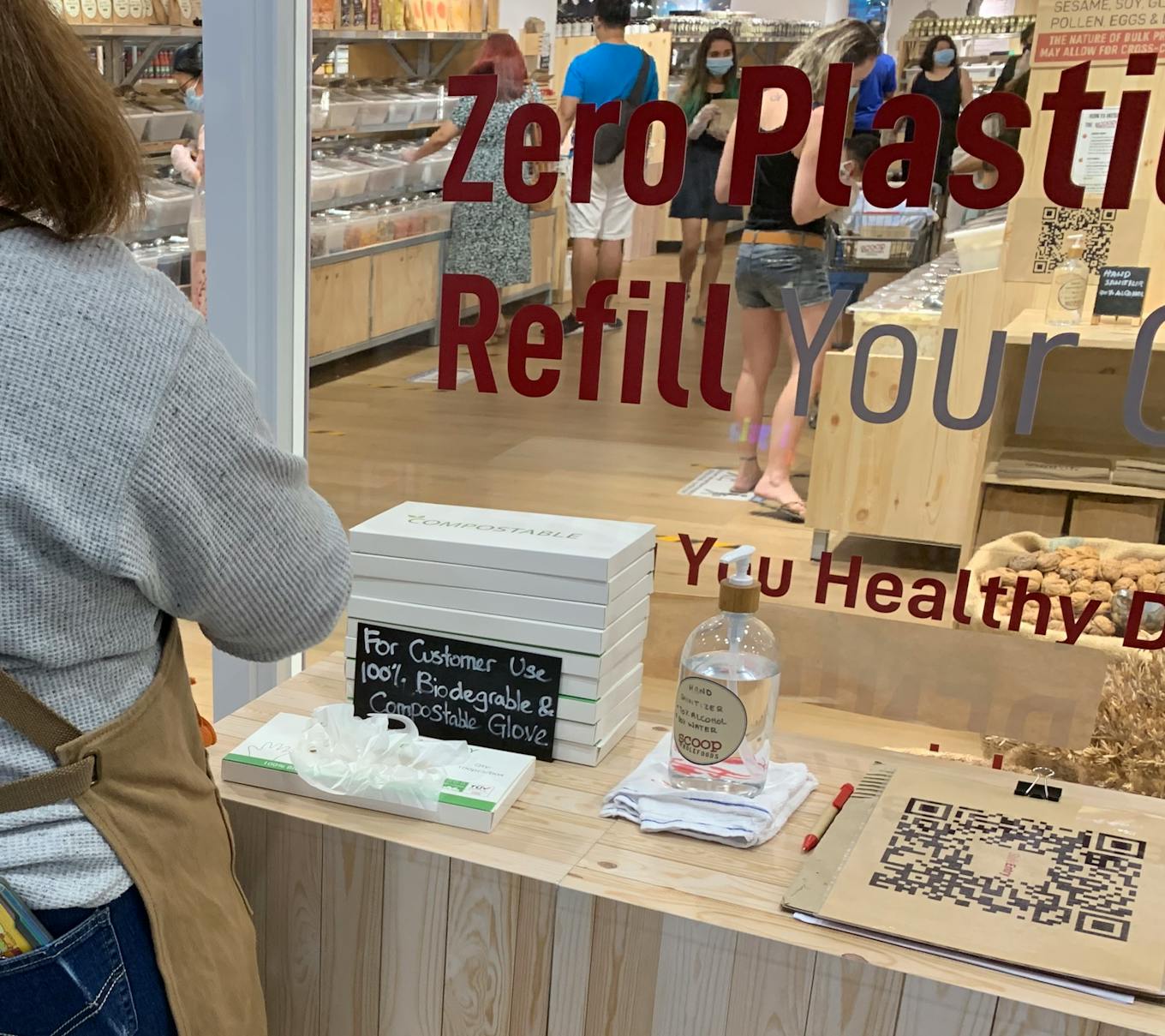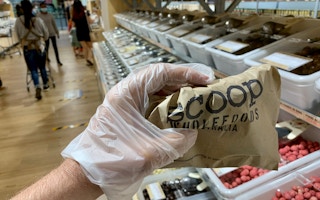A high-end organic foods retailer promoted as “plastic-free shopping” has mandated disposable plastic gloves for customers in its stores in Singapore as a coronavirus prevention measure.
To continue reading, subscribe to Eco‑Business.
There's something for everyone. We offer a range of subscription plans.
- Access our stories and receive our Insights Weekly newsletter with the free EB Member plan.
- Unlock unlimited access to our content and archive with EB Circle.
- Publish your content with EB Premium.
Before entering its stores, customers of Scoop Wholefoods must register using a QR code and then don a pair of single-use plastic gloves. The Australian chain says the gloves are an additional hygiene measure for customers, which use scoops to take dried food from self-service bins in the store.
Scoop’s stores in Australia and the United Kingdom have not introduced the disposable gloves policy, Eco-Business understands.
Scoop is the only zero-waste retail brand in Singapore to introduce such stringent hygiene measures. Until mid-June, when the city-state entered the second phase of opening up following a period of lockdown, Scoop customers were asked to use hand sanitiser before entering the stores.

Scoop’s disposable gloves stand outside its store in Great World shopping mall, Singapore. Hand sanitiser is optional, the gloves are not. Image: Robin Hicks/Eco-Business
Rival packaging-free bulk food brands Unpackt and The Source, which also use a self-service model, ask customers to use hand sanitiser but not plastic gloves.
The move comes as environmentalists worry about the mounting waste burden of the Covid-19 pandemic. Personal protective equipment has been called “the new pollution” as waterways become clogged with discarded disposable masks and gloves.
Scoop said the gloves are “100 per cent biodegradable and compostable” as they are made using corn and starch.
Scoop told Eco-Business that the company is “under immense pressure and supervision from government officials as our concept is very new and involves unpackaged goods,” adding that there have been no reported cases of coronavirus in its stores.
“In order to prevent [coronavirus spread] and please our customers and supervising government officials, we have implemented this strategy to keep both the hygiene level of our store at a high level and reduce the threat of closure. Thankfully, this does not cost the Earth,” the firm said, adding that it was “still on our plastic-free mission”.
Scoop has pledged its support for next month’s Plastic Free July initiative, a global movement that encourages consumers around the world to refuse single-use plastic.
Tom Peacock-Nazil, founder of ocean clean-up and plastic offsetting firm Seven Clean Seas, said that the disposable gloves initiative, while “hugely ironic” for a zero-waste store, is an understandable defensive move as businesses come under increasing pressure to raise their hygiene game.
Hotels in Singapore have pivoted from buffets to a la carte menus, because of the higher contamination risk of self-service restaurants, Peacock-Nazil noted.
However, he said that using biodegradable or compostable plastic would not reduce the environmental impact of the disposable gloves. “Even if they’re made from plant-based material, in Singapore we know they’ll be incinerated.”
He added that there was a need for consumers to question corporate sustainability messaging. “If brands tell them [consumers] it’s biodegradable, they believe it. If brands tell them it’s sustainable, they believe it. No one is asking the right questions to understand the mechanics behind sustainability claims,” he said.
Retailers in Singapore have taken a diverse approach to sustainability amid the Covid-19 pandemic. Some, like Starbucks, have rescinded bring-your-own container schemes in fear that they could aid viral spread, while others, like The Coffee Bean & Tea Leaf, have not.
Starbucks told Eco-Business that it wanted to provide its customers with “peace of mind” and planned to reintroduce reusables “as our stores evolve from takeaway and to-go models, and in line with local government and health official guidance”. Singapore’s National Environment Agency has not restricted BYO schemes.
Last week, more than 100 health experts and scientists signed a statement to reassure consumers and retailers that BYO container schemes do not post a public health threat if basic hygiene rules are followed, and can still be used as an alternative to disposables.














